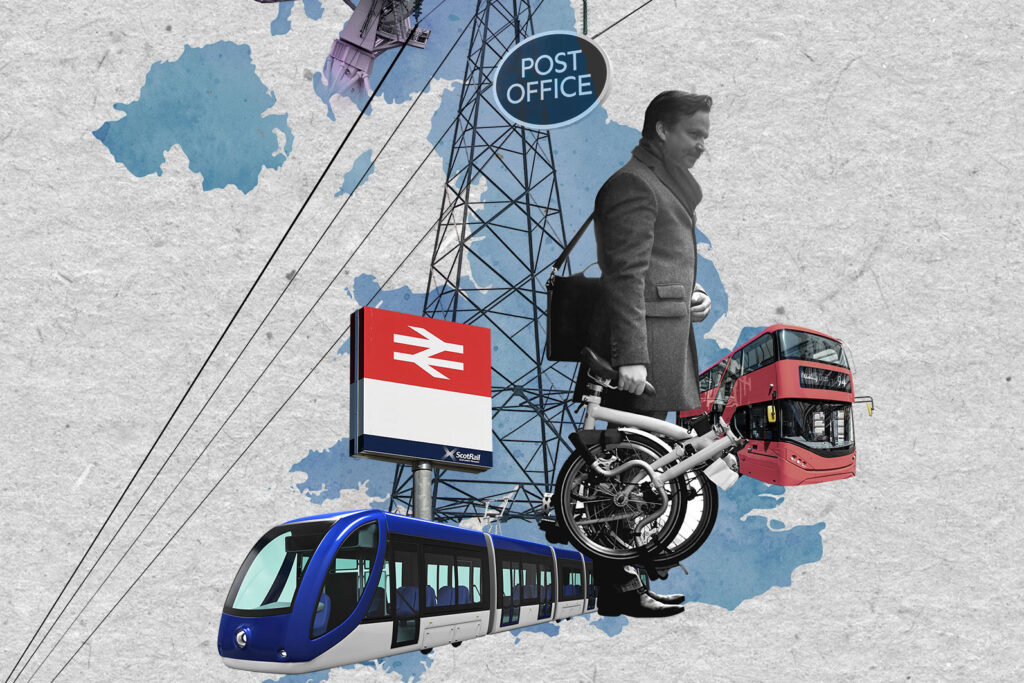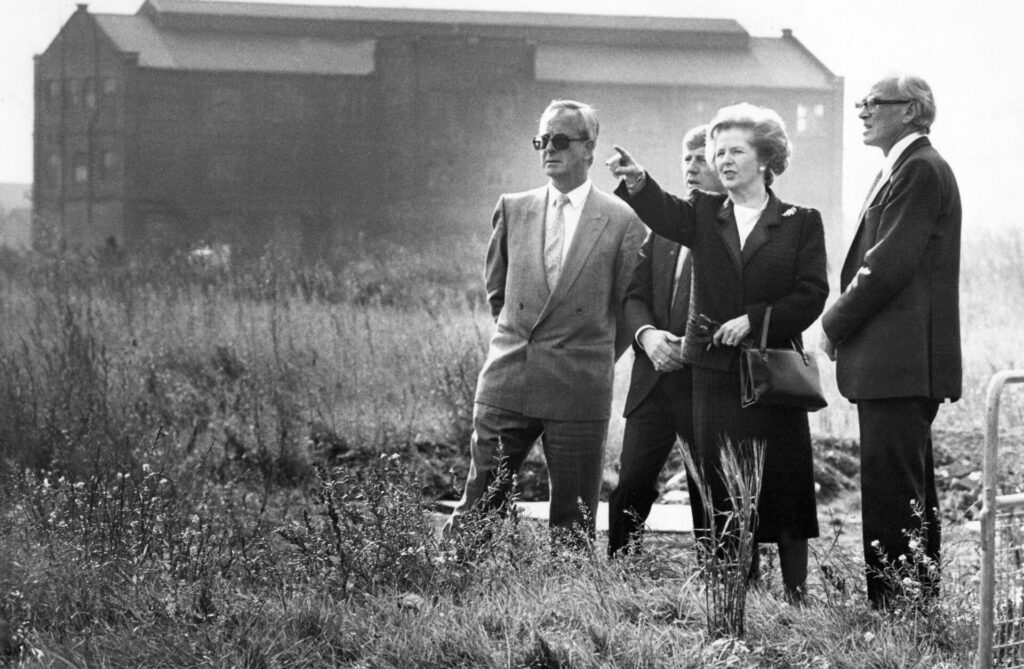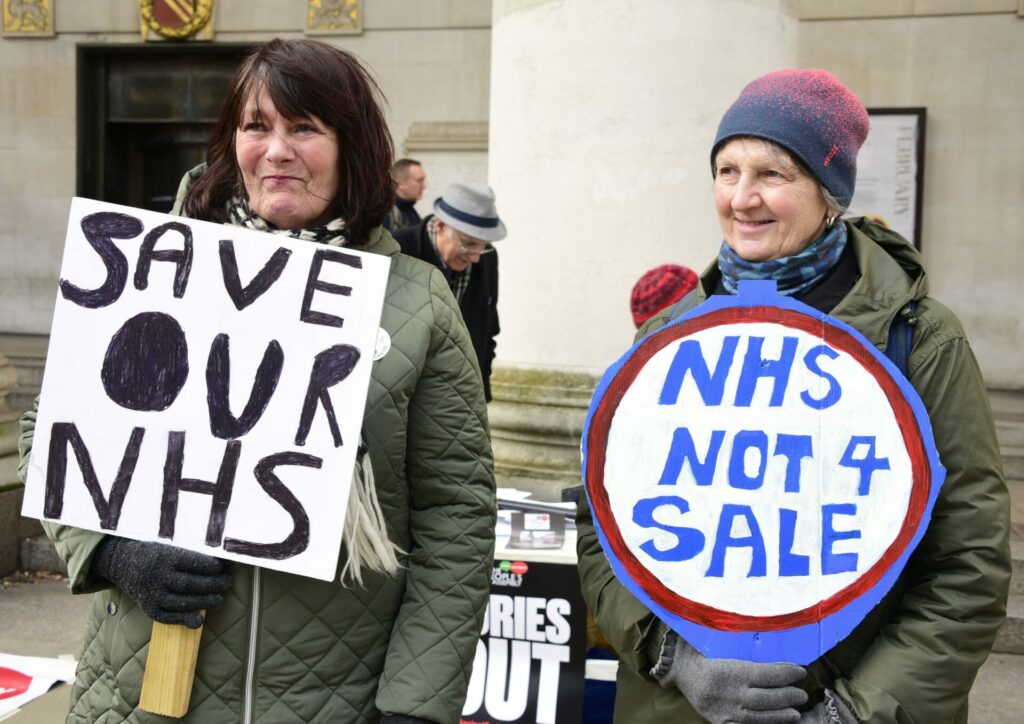Has Privatisation Failed the UK?
From energy companies to the travel network and the creeping privatisation of the NHS, Obsidian Adebayo asks whether Margaret Thatcher’s vision of a competitive Britain has built a better nation

Whether or not privatisation has failed Britain is something I often find myself wondering about. I studied economics and had a subsequent career in finance, so you might assume that I’d think that it’s working perfectly fine. After all, a career in investment banking isn’t exactly anti-capitalist in nature. However, the theory and the experience of living in a capitalist society are poles apart.
Even I can admit, as somebody coming from a poor socioeconomic background who is Black, queer and non-binary, that although capitalism has been part of what has enabled me access into privilege, it has also been a huge part of what makes everyday life difficult. Not just for me, but for way too many British people who are not only trying to access basic amenities of water, electricity and a roof over their heads, but also in our modern society, requiring access to the internet, banking and affordable transport.
Growing up in Luton and studying in Bedford in the early 00s meant that I regularly used what was then called the First Capital Connect train service, which is now managed by Govia Thameslink. Anybody familiar with this route will be no stranger to persistent delays and overcrowding, as well as limited alternative options. As a young child, I often found myself waiting for a train that was delayed by hours or cancelled entirely, which meant being alone until dangerously late into the night for my immigrant parents to finish their low-paid jobs and pick me up.
Growing up under a Blair government and being so young, I had no idea why this was the case, believing of course in the equality of opportunity and that if my parents were simply rich enough and if I worked hard enough, I wouldn’t have to get the train at all! This lack of awareness, of course, came from me being completely ignorant of the history behind the lack of options in the first place and what was driving the increasingly unaffordable costs for my family.
Later, in my early adulthood, studying at university in London and discovering the entirely different experience that is Transport for London, I was blown away by the myriad choices available and the affordability and ease of getting around the city. It wasn’t until then that I began to contemplate what the benefit of the privatisation of the rail network was, when compared to a publicly run system such as the London Underground.
“Capitalism has been part of what has enabled me access into privilege. It has also been a huge part of what makes everyday life difficult.”
It’s hard to pinpoint when exactly privatisation in Britain started, but it became a central pillar of British economic policy under Margaret Thatcher’s government when the Conservatives came into power in 1979.
Before then, the Labour government arranged the sale of some of the state’s shareholding in British Petroleum, but it was by no means predicated on the belief that state-owned industries should be privatised; rather it was a result of budgetary pressures at the time.
The philosophical shift within British government that state-owned industries should be privatised and left to the free markets has rightly been attributed to the Conservative Party. It was a dogma pushed and held by Thatcher, in particular.
The Conservatives in opposition, led by Thatcher, had long been calling for a denationalisation effort. She had been heavily influenced by the 1977 Ridley Report, written by right-wing Conservative MP Nicholas Ridley, a founding member of the Selsdon Group of free market Conservatives. In this report he proposed that a denationalisation or privatisation strategy was the best way to take on trade unions and prevent miners’ strikes, which many in the Conservative Party felt were detrimental to profitable business and the economy at large. It was also, of course, fundamentally politically driven, as trade unionists were major backers of the Labour government, hence it was a way to destabilise that voting bloc, too.

The Conservatives called this “popular capitalism”: in a speech by Thatcher in 1986 she insisted that worldwide, privatisation was enfranchising citizens. With this argument she positioned the party as one that was truly for the people, insisting that privatisation was a way to return power back to the individual, rather than to keep it in government hands. This, of course, is also known as economic liberalism, a theory advocated by Friedrich August von Hayek, who, after meeting Thatcher in 1975, was able to convince her of the ideas outlined in his book, The Constitution of Liberty, which Thatcher famously espoused as the foundation of the Conservative Party doctrine.
To give some context of Hayek’s views, he was a supporter of the Institute of Economic Affairs, where free market campaigner Linda Whetstone was a trustee. At the Conservative conference in 1978, in front of Thatcher, no less, he gave a speech saying: “The next Conservative government must not pander or protect certain sectors. Let’s not go out of our way to help small businesses, agriculture trade unions, coloured people, women.” It was a telling speech, which also coincided with the poignant anti-immigration focus of Thatcher during that period.
According to her and other proponents of economic classical liberalism or ‘Thatcherism’, as the media dubbed it at the time, privatisation would mean greater freedom of choice for people and was inherently linked to morality. Thatcher proclaimed that every citizen should have the fundamental right of freedom of choice and that the only way to do this was to decrease government intervention in free markets, and to denationalise and also disempower unions, who were seen as obstructive to business profitability and economic growth. Privatisation was the main way to increase wealth of the individual, she and the Conservative Party claimed.
A central argument of theirs was that in the hands of the Labour government, strategic important assets such as British Telecom and British Gas would be renationalised, therefore taking away the opportunity for the private citizen to have shares in them. This was attractive on the face of it, but of course, in practice, it was far from giving power and access to all — only the privileged few who could afford to buy shares would benefit.
Back then, at least, I’d say you’d be forgiven for believing her. After all, there was genuine mismanagement of these industries by previous governments, although it must be said that privatisation hasn’t remedied this. Furthermore, the idea of decentralising power is very attractive, too. Why wouldn’t the average person, watching the privileged few, as well as government officials, be encouraged by the idea that they too could increase their wealth through hard work?
Unfortunately, this is not what happened. Instead, what we saw was rife unemployment which more than doubled from around 1.5 million at the time Thatcher came into power in 1979, to over 3 million in just five years in 1984, resulting in the highest joblessness rate in post-war history, and far above some of the highest current estimates for unemployment likely to be caused by Covid-19.

Inequality also increased under her policies: by 1991 when she left office, the gap between the richest and poorest had hit a record high. Social inequality was damaging groups ranging from working-class coal miners to the LGBTQ+ community.
As for choice, one need look no further than what has happened to the rail system in the UK. I’m sure I’m not alone in bearing the brunt of inflation- busting increases in train fare costs over the years, not to talk of approximately £10 billion the government has shouldered to bail out the industry during the pandemic.
Where private operators have monopolies, on most routes there is only one choice, and that has only become more expensive. The situation fundamentally undermines the concept of a competitive market. Furthermore, the main argument of increased efficiency has not actually materialised; the government setting a target of 75 per cent of costs recovered from passengers has only been achieved once since privatisation, compared to several times beforehand.
So, what does this all mean? Well, it indicates that it isn’t just the argument for privatisation that is empirically weak, but the lived experience of so many, including myself, demonstrates that it isn’t the silver bullet it’s often purported to be. In fact, the reality is much more nuanced and the sensitivity of each industry and its role in our society should be taken into account when considering if its privatisation would be of real benefit to British society.
An industry that acts as a clear example of how important it is to the wellbeing of our society, whose plight has only been made more acute through this recent Covid pandemic, is the National Health Service. Its backdoor privatisation has been well documented in mainstream media. Millions including myself have very real experiences of being left on extremely long waiting lists for access to services including mental health or even the Gender Identity Development Service, which has a years-long waiting list and a backlog numbering in the thousands. I have been privileged enough to be able to access some care privately, but this is out of reach for a large proportion of British people.
This is not to say that the public management of the NHS is without its problems, of course. However, the introduction of the internal market and the private finance initiative, in particular, have actually amplified issues that the public management of the NHS has been criticised for. Costs of financing hospitals are much higher now than they would have been if they could access government financing and, far from encouraging more efficiency, the internal market has actually resulted in more bureaucracy.
These are surely extremely negative impacts, which bring the entire argument for the privatisation of such societally important industries into disrepute. After experiencing the pandemic, I have a new-found appreciation for how much strain the NHS has been under. The lack of access to PPE, the disproportionate impact on frontline staff such as nurses, as well as the inability of the NHS to withstand the demand for services outside of Covid, impacted such key core services as cancer treatment.
Many government officials have argued that this was unforeseeable and largely due to Covid, but the strain on the NHS due to underinvestment over the past decade was clearly forewarned by experts, academics and health professionals alike. If the aim of privatising elements of the NHS was to ensure better provision of services, then it is very clearly failing in this regard.
“After experiencing the pandemic, I have a new-found appreciation for how much strain the NHS has been under”
I’m sure you’re wondering, as have I, what the alternative could possibly be? After all, many of these industries have already been privatised, or are well on their way to being so. In my opinion, there are a few routes ahead.
I am not entirely confident in the ability of our current government to manage making industries such as rail or utilities public again, but I do think that a review of how privatisation is being conducted is of paramount importance. It doesn’t make sense for the government to pursue a very basic, blanket approach to all industries, based on outdated economic ideas that did not consider an increasingly diverse, technologically driven modern society.
Perhaps there is something to learn from the other nations that Thatcher listed as following the lead of Britain in pursuing popular capitalism. For example, in France, Électricité de France is still majority-owned by the government. This has resulted in electricity remaining largely affordable for French citizens, rather than the extremely negative impact increased prices are having on British households.
Another nation Thatcher highlighted is Singapore. The UK could learn from its foray into the privatisation of the rail system and the resulting failure, which has triggered genuine public discourse on renationalising the system. The executive chairman of Banyan Tree Holdings, Ho Kwon Ping, who is not an advocate of renationalisation, admitted that the nature in which Singapore’s public transport system was privatised may have gone too far and that Hong Kong is an example of privatisation that has worked better in practice. Its Mass Transit Railway system has been dubbed one of the best in the world and is publicly run, alongside private options such as trams.
Here the government provides a key service that it recognises as central to a well-functioning modern society, while not excluding the provision of alternative private options, which allows for freedom of choice, and does not dampen competition to the detriment of its citizens.
Ultimately, the route ahead is far from clear, but I genuinely believe that it’s of paramount importance that we ask ourselves if choice as an end in itself is what is most important. Or is a system in which everyone, regardless of their background, is able to access core services at an affordable price preferential? How hard you work (or not), or the size of your pay packet should not govern whether you can access basic amenities — be they water, energy, communications or transport — that are essential to modern living. It should be a clear right. Equitable access should come before shareholder profit.
That is, at the very least, the Britain I grew up believing in and the Britain I would love to see us all thrive in. Whether it’s through capitalist or social models, or a mixture of both, the barometer by which we measure the success of these approaches should be driven by whether everybody has easy and affordable access to the essentials for an acceptable standard of living.
Ultimately, economic growth is for nought if it doesn’t result in increased wealth and decreased inequality. What better way to make sure that we grow sustainably, than ensuring that everybody has the basic human right of access to core services. It’s in everyone’s interest for these areas to prosper in a way that’s truly fair and equitable for all.
